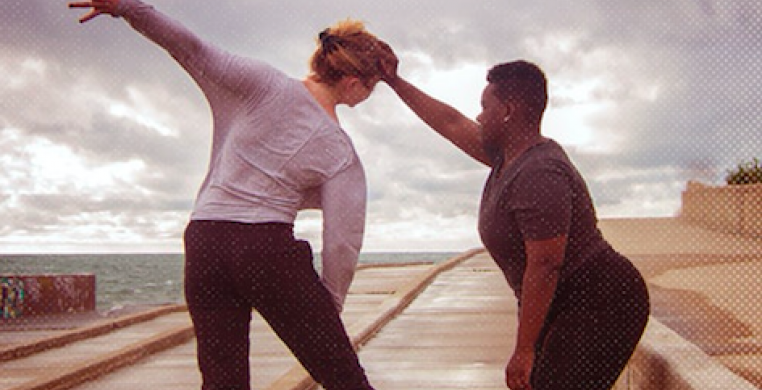Through Saturday at Links Hall, choreographer Paige Caldarella and dramaturg/filmmaker Jessica King offer “If Left Unchecked,” a two-act, hour-long dance and film montage on female rage. In the work’s opening moment, dancer Keyierra Collins has her head tucked into Jess Duffy’s back. She thrusts her elbows side to side, then switches to a jab, like a karate chop, with hands flexed toward empty seats on the side of Links Hall’s studio B. She breathes heavily – one exhale per jab – going nowhere despite her best effort. A blackout gives the duo time to shift their position upstage, and now it’s Duffy’s turn to instigate. Duffy’s movement is more representative of classical ballet; she makes brisk pas de basques and coupés, which similarly go nowhere due to Collins’ hand pressed against her forehead. These opening vignettes, in which each woman takes turns charging and resisting, soloing and resting, are accompanied by a distorted sonic landscape that, in the beginning, only hints at its inspiration: “Symphony No. 4 in E minor, Opus 98” by Johannes Brahms.
Composer/sound designer Jake Nikolas’ Brahmsian dystopia speaks directly to Caldarella’s movement without resorting to mimicry, and on occasion, let’s those familiar – for me, anyway – symphonic passages shine through the relative chaos. In the first half, it all seems like a metaphor for ballet. Duffy walks on tip toe in her solo, moving on an upstage diagonal and then tumbles to the ground downstage, almost referencing Giselle’s descent into madness. Each moment of “If Left Unchecked” is a blend of dance histories extracted from each performer’s body – a fusion of classical ballet, contemporary, modern, and West African dance – with no one lexicon speaking louder than another. And yet, the scattered swells of Brahms in the background lead one to think the goal might be to find a sort of liberation in ballet, a form seen by many as epitomizing femininity, yet somehow holding women back. Ballet is perceived by many as rule-bound and restrictive. What might be gained by following those rules? By breaking them? “If Left Unchecked” does both, and it’s thrilling.
On a recent trip to New York, I had the privilege of seeing “Variations on Themes from Lost and Found: Scenes from a Life and Other Works by John Bernd” at Dancespace Project as part of the American Realness Festival. Ishmael Houston-Jones and Miguel Gutierrez, with help from University of Illinois dance faculty member Jennifer Monson, re-constructed excerpts from the final seven works created by Bernd before he died in 1988 of complications from AIDS. Bernd’s work was a direct response to the AIDS crisis while he himself was living it. It was a time of personal and societal chaos, that inevitably left many wondering, “What is happening?!?” The remarkable impact of these works thirty years later points to the saliency of how particular moments in history change us, or change our perceptions. And yet, one becomes aware of how little has changed.
Here at home, a number of choreographers are taking up the chaos of now, using bubbling visibility about gender and racial inequity, political protest and societal uneasiness as fodder for dancemaking. Watching “If Left Unchecked,” I started to wonder how some time and distance might change my perception of this work. Will it cut to the bone in the future as deeply as it did on this weekend in 2018? My suspicion is yes, perhaps even more so, as we eventually come to the other side of whatever is happening, likely realizing how our perceptions have changed, yet becoming aware of how little has changed.
Caldarella and King's program notes are more reassuring, noting how rage “can be a powerful engine for resistance and progressive social change when experienced – and enacted – across lines of difference.” Maybe, but the dance indicates otherwise. Despite the beautiful blending of dance forms and bodies onstage, and a harmonious interdisciplinary collaboration between Caldarella and King, the work offers little evidence that exerting rage will actually effect change. In the beginning, Duffy literally holds Collins back, and vice-versa. A woman prevents another woman from making progress. The second act’s opening is a stunning split screen video of each woman submerged in a pool of water, fighting against it with their bodies and screaming inaudibly, while the waters above are presumably calm. But in other moments, they each appear to give up fighting, floating toward the surface for reasons unknown. Are they gathering the energy to start again? Accepting that this is a fight they may not win? At least, not yet?
The last section of dancing, an exhausting unison phrase, is the least balletic of the piece. Yet, devoid of ballet’s rules (and almost all hints of Brahms), the two women are somehow still trapped inside the movement, destined to repeat it over and over, ending with a fall to the floor, only to get up and do it again. They pace upstage and down, two steps forward, one step back. This goes on far longer than it needs to, but maybe that’s the point. Yeah, that’s probably the point.
“If Left Unchecked” generates momentum, but does not make progress. It works in fits and starts, with tangentially-related sections separated by blackouts, tiny cliffhangers that feel a bit like unfinished sentences in a paragraph that somehow makes sense. It only serves the theme, stifling these women from achieving self-actualization, equality, validation, social change – whatever it is – which is why I’m so curious about how history will remember this dance. Reflecting on the evening, “If Left Unchecked” is like a jigsaw puzzle. All the pieces are laid out on the coffee table, face up. The question is: do those pieces need to be clicked together?
--“If Left Unchecked” continues through 7 p.m. Saturday at Links Hall, 3111 N. Western Ave. Tickets are $5-10, with Hot Deals available on See Chicago Dance.
Lauren Warnecke is the dance writer and critic for the Chicago Tribune.


